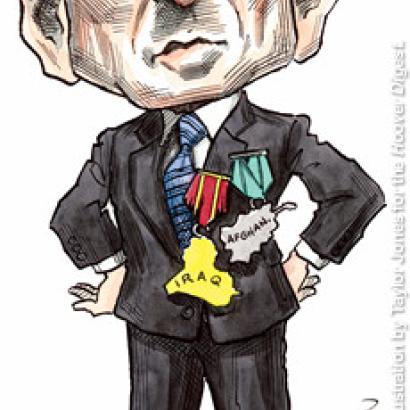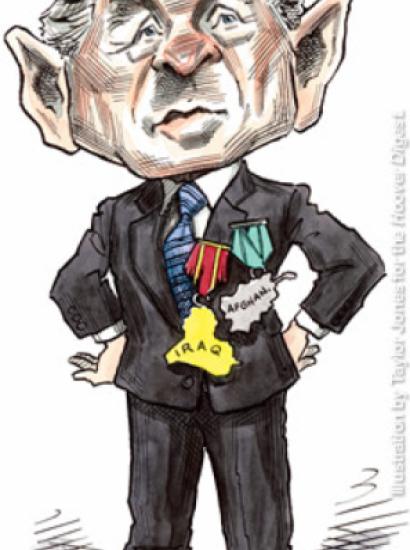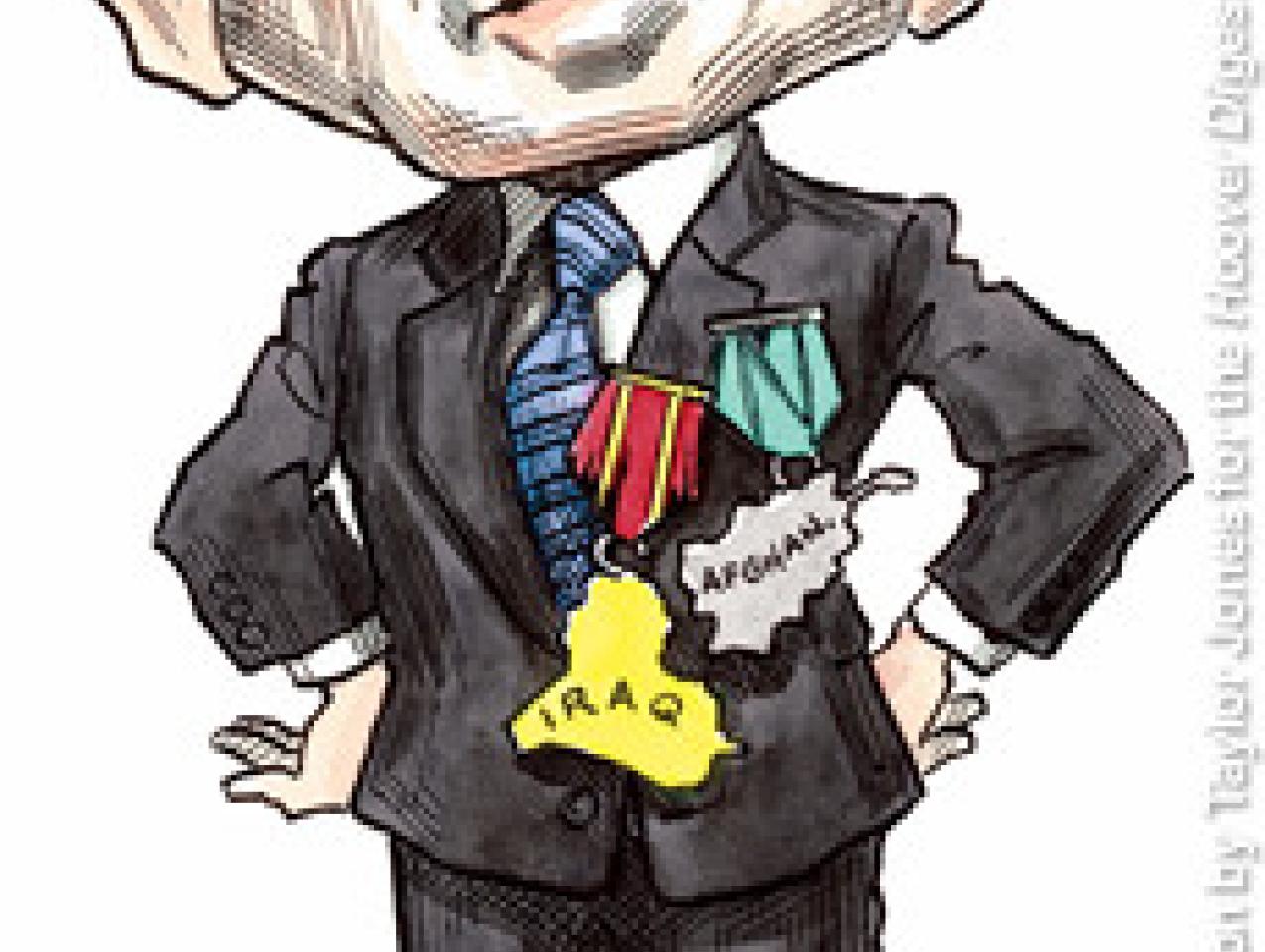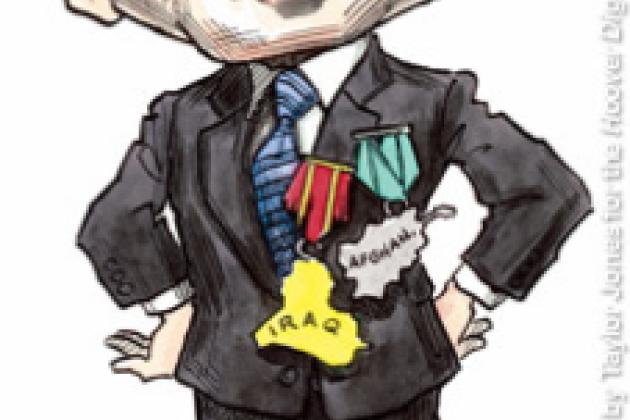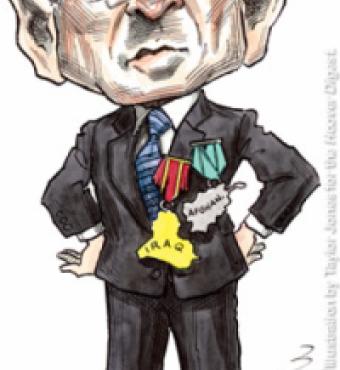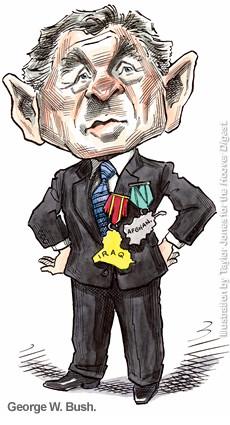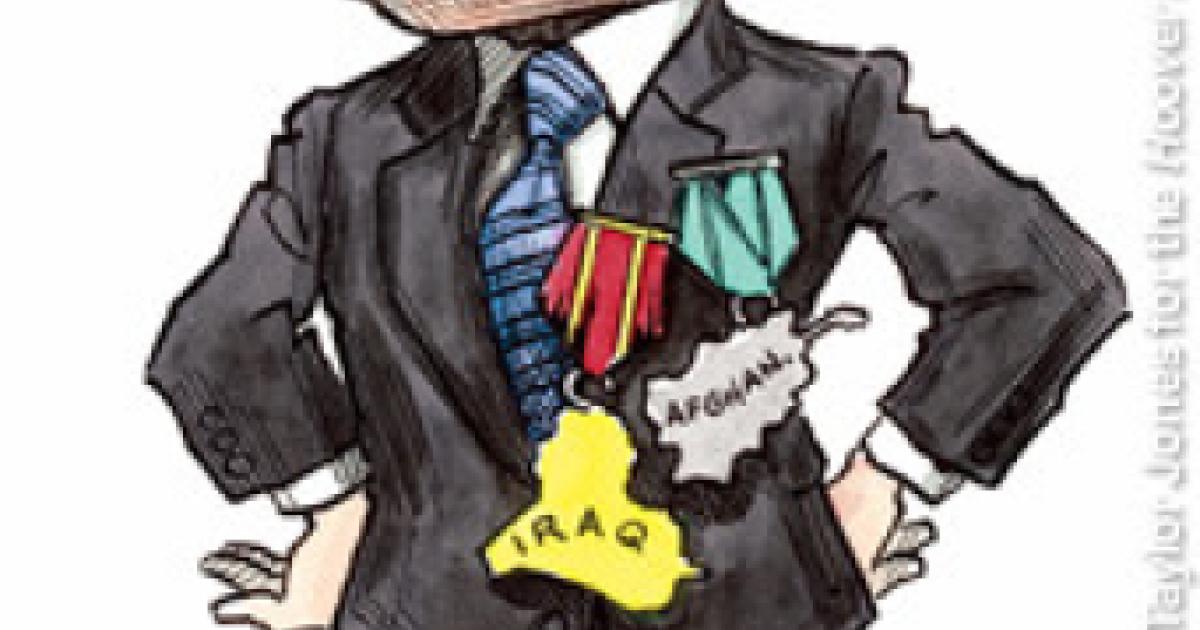- Campaigns & Elections
- The Presidency
- Politics, Institutions, and Public Opinion
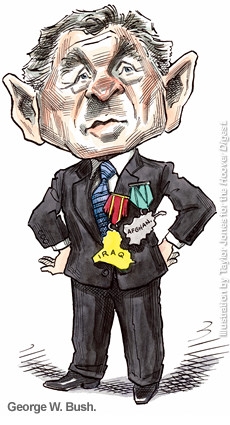
The most striking and obvious element of the presidential campaign thus far has been the remarkable anger, almost personal hatred, toward the president among Democrats. I think this anger began with the election of 2000 and Florida—the perception among Democrats that the election was stolen. But that, in itself, is not quite enough to explain the extent of the Democrats’ bitterness. What rubs Democrats raw is not that George W. Bush is simply an illegitimate president but that he has become a consequential illegitimate president.
Democrats (along with many other people, including conservatives) had imagined from the 2000 campaign that Bush was someone who would be a transitional president, a moderate president, a placeholder. The shocking reality is that he became a consequential president, an extremely important president, and one who might even be called a transformative president. And that is hard for Democrats to take. It is one thing to have a pretender in office; it is another to have a usurper who matters.
The Big Picture
The presidency that we have seen over the last three years has been quite remarkable. I don’t think any of us would have predicted it on the basis of his past record or even on the first eight months of his presidency. What makes George Bush consequential is that he does, and is interested in, large things. He is not a Bill Clinton, worried about student uniforms and the minutiae of social arrangements. He goes for the very big picture, which makes him very much like Ronald Reagan.
So what has Bush done? He has made structural changes in government and the economy with his tax cuts that will define the shape of government for a long time, much as the Reagan tax cuts did. Then he went after the great Democratic issues: Medicare and then, astonishingly enough, immigration. A lot of conservatives are upset about this and they worry about deficits. But the big picture is that this is a man who sees large problems—immigration, Medicare reform, tax cuts—and he does things. Even the much-ridiculed space initiative is another example of the vision of this president.
But of course the largest issue is not domestic but the Bush Doctrine. And that is where he has truly shaken the Democrats and redirected America. Consider the contrast between the foreign policy of this administration since 9/11 and what we saw in the 1990s under Clinton. The Bush Doctrine is a radical doctrine. It believes in preemption, and it is prepared to be unilateralist.
To be sure, the drumbeat of criticism about unilateralism is overdone because in fact every unilateralist wants coalitions and allies. But the issue of unilateralism versus multilateralism hinges on what you do when you need to act alone, when you do not have as many allies as you want. Are you inhibited by the absence of France and Germany or not? And on that issue the president spoke loud and clear: He is not. This defines a very strong and correct orientation in foreign affairs: one that the Democrats, of course, are shocked by, because their entire foreign policy consists of a kind of wooly internationalism where everything is punted over to the United Nations.
Especially important has been the redirection of policy in the war on terror away from what it had been for 20 years: law enforcement—catching the bad guys, putting them on trial, sticking them in jail, and then becoming complacent. That ended on 9/11. If we look at what happened in the first hundred days following 9/11, I think it is one of the most remarkable demonstrations of leadership by a president in American history. George Bush developed a policy, he annunciated it in a magnificent speech 10 days after 9/11, and then he went into a war in Afghanistan that everybody thought was going to be impossible. And we won that war in the most astonishing way.
Paul Kennedy, the Yale professor who in the 1980s wrote about the decline in American power, wrote an article in February 2002, shortly after the war in Afghanistan, in which he essentially recanted. He wrote about the unbelievable display of power by the United States, which shook not only Afghanistan and the Arab world but also capitals in China and Russia and Europe. American power, used audaciously, had left every other power in the world so far behind that we were entering a new era of dominance—what some call unipolarity, or American hegemony. But such dominance needs not only the power but also the will to use it. And the president displayed that.
Now that success in foreign policy has of course been jeopardized in public perceptions by the war in Iraq. And, to a large extent, this presidency will hang on the success or lack thereof in Iraq. But Iraq again has demonstrated a president with great political courage and vision. Had President Bush not invaded Iraq, no one would have complained, certainly not Democrats. The world did not want him to do it. A lot of Americans did not want him to do it. No doubt many of his advisers knew that Iraq could have a huge political downside. And yet he did it because he believed it was necessary. He believed that 9/11 taught us one thing: that we had enemies in an Arab world that had become a cauldron of hatred and that, unless we changed it rapidly, we would suffer more 9/11s in the future.
Afghanistan was one step. The war on terror in places like Indonesia and the Philippines was a second step, but we had to go into the heart of the Arab world, namely, Iraq. We used the admittedly blunt instrument of the American military. Now we are using all our resources in reconstruction. This approach succeeded in Germany and Japan following World War II, has not succeeded that well in the Balkans, and may not succeed in Iraq. But I think it is our only alternative. Only with this bold and forceful approach to changing the culture of the Middle East will we eventually win the war on terror.
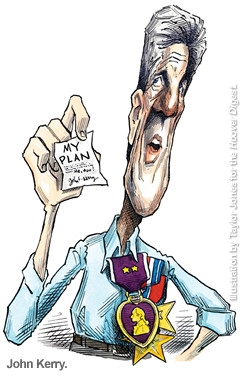
A Lack of Conviction: Kerry and the Democrats
So here is a president who did big things, which is unforgivable in the eyes of Democrats. That is why they are so united and so angry—and why they have settled on John Kerry.
The Howard Dean phenomenon was fascinating. I think when historians write about this election, the Dean story will be the most interesting. He really was an Internet bubble of sorts. Dean tapped into the Democrats’ anger, but he was not a serious presidential candidate and simply self-destructed. Kerry is not loved by Democrats. They know his weaknesses, but, in a lackluster field of contenders, Kerry became the candidate by default. The best bumper sticker I saw was “Dated Dean, Married Kerry, Woke Up with Bush.”
The interesting thing about Senator Kerry is that he has played his trump card very early. And I think that is a mistake. He played it well and he played it hard—the Newsweek cover of the two young men side by side, Bush in his black-and-white photo and Kerry with his color one, is a pretty obvious message. But I don’t know if he can use Vietnam as a shield for eight months. The National Guard story will not be a story by September. It is not a story anymore.
The defensiveness of Kerry in answering questions on national security is quite shocking. The typical response from the Kerry team when his record is challenged (the sort of Clinton war room response that was made famous in 1992) is “I will not sit back and allow my patriotism to be challenged.” Patriotism, as Samuel Johnson once said, is the last refuge of the scoundrel. Kerry’s protestations of patriotism are the last refuges of an anti-war liberal. The reality is clear: His record is quite negative and one that will not withstand scrutiny. It is not only the votes on defense spending; it is that on every major issue of our time on national security, he has gotten it wrong. Consistently wrong.
It starts with the nuclear weapons freeze, which you all remember as a sort of hysteria of the early 1980s. Had it been enacted, it would have prevented us from deploying Pershing and cruise missiles in Britain and Germany, which were a counter to Soviet missiles in East Germany (a plan that had been proposed by Jimmy Carter, of all people). And when Reagan and Thatcher moved to deploy the missiles, there were the largest demonstrations in American history, including a million people in the streets of New York in 1981. And of course Kerry joined the bandwagon. But the freeze was defeated. In the end, we had negotiations with the Soviets, and they removed their missiles from East Germany. It was the beginning of the end for the Soviet Union, and it was their last attempt to destabilize us internally into unilateral disarmament.
Next was the war in Central America, about which Kerry now proudly says, “I opposed Ronald Reagan’s illegal war in Central America.” What he does not say is that of course it was not illegal. It was supported by Congress, albeit in a confusing and erratic way, except that Kerry was always against it. And we know that the consequence of supporting the contras was the end of the Sandinistas, the liberation of Nicaragua, and ultimately the democratization of all of Central America. Yet Kerry proudly stands against that.
On the Gulf War, Kerry voted against it. And we know that after the Gulf War the UNSCOM inspectors discovered Iraqi nuclear programs that were entirely unknown when the decision was made to go to war. Had we not gone to war, Iraq would have been a nuclear power within a year.
On the current war in Iraq, Kerry seems to have three positions—yes, no, and I was tricked by the president—which he holds simultaneously and none of which he explains very well. That is a record that I think is indefensible. And Kerry knows that, which is why, whenever his record is raised, he answers, “You are attacking my patriotism.” That will work a few times; it won’t work over eight months.
But the larger issue is that the Democrats simply have nothing positive to offer in the war on terror or the situation in Iraq. Yes, they offer a critique of Iraq. But when you ask them what they would do otherwise, they have nothing to say. They say “internationalize” as if that is a panacea. Of course we would like the French and the Germans to be in Iraq—we could use their help—but there is no formula. There are governments who opposed our policy on principle and would not support us then and will not support us now. The idea that somehow we have rejected the United Nations is absurd. The wonderful Portuguese U.N. civil servant Sergio Vieira de Mello was running an extremely successful program in Baghdad, but, when its compound was attacked by a bomb in August 2003, the United Nations ran away. Now you can defend or attack the U.N. decision, but it had nothing to do with American unilateralism. We wanted U.N. support, but it would not stay in an insecure situation. We are now getting some U.N. support again, and I think it is going to help us. But “internationalizing” the war on terror means nothing, or it means acquiescing to the United Nations and allowing our policy to be driven by the veto of the French or the Russians or the Chinese or others. That is not a policy. And it will never sell with Americans, who do not like the idea of American foreign policy, particularly the defense of our country in the war on terror, being handed over to the cynics at the Quai d’Orsay.
If you ask Democrats what we should do in the war on terrorism, they essentially say we should be sitting on our docks inspecting containers as they arrive. That is a nice idea, but it is not how you win the war on terror. And it is the absence of any policy to counter the vision and the boldness of the Bush Doctrine that I think is the weakest element of the Democratic position. It is a fact that for two and a half years we have not had an attack on our soil. No one wants to say this in public, and no one writes about it, because everyone is worried an attack is going to happen tomorrow. But if you had asked anyone in Washington or elsewhere on September 12, 2001, whether we could avoid attacks for two and a half years, no one would have thought it possible. Either this is a pure accident of history, or we have been doing something right. We took the war to the enemy, we denied him sanctuary, we scattered him, and we sent a message to every other country in the region: If you help these guys, we are going to get you.
The war in Iraq has had a similar effect. Granted, there were no weapons of mass destruction found, which is going to hurt this administration. But the fact remains that the success of the war (and the capture of Saddam) has had a great deterrent effect on others in the region. It is not an accident that Libya decided all of a sudden to give up its weapons of mass destruction. Qaddafi saw what the United States did in Baghdad, and he decided to do what the Americans wanted. This is a remarkable admission of the uses of force and the deterrent effect on others of the use of force. It is also no accident that Iran has agreed to spot inspections—for the first time ever—and we have now discovered significant elements of a secret nuclear program.
These are effects of the war, and these are successes. Consider the changes in the region from September 10, 2001, to today: Afghanistan is liberated and no longer a sanctuary; Pakistan is now our greatest ally in the war on terror; Iraq is liberated; Libya is disarmed; Iran is worried; Syria is very quiet. And the world is on notice.
Yes, we have had great difficulties in Iraq, and we may yet fail there. But I can assure you that, if the Democrats are elected, we will not succeed because their heart is not in it. They reject the forward strategy; they want to hide behind international institutions, and they want to be passive and count the cargo ships and inspect them coming ashore. That is how they see national defense. And that is their weakness.
The dynamics of this election are clear. It will be on national security, and it will also obviously be on the economy. In a sense I think the president is hostage to events. The reelection of a president is generally a referendum on his presidency; it is not so much a contest of two men. I think that if the economy stays reasonably strong and begins creating jobs, and if Iraq remains reasonably stable between now and the election, the president wins, albeit rather narrowly. I also think to the extent that it is a contest between two men and their visions, the president would prevail on the merits.








